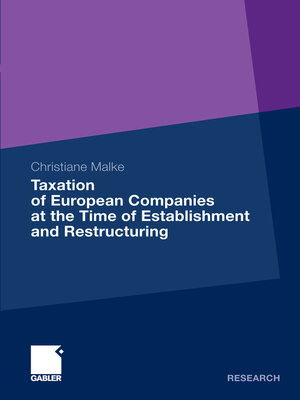Taxation of European Companies at the Time of Establishment and Restructuring
ebook ∣ Issues and Options for Reform with regard to the Status Quo and the Proposals at the Level of the European Union
By Christiane Malke

Sign up to save your library
With an OverDrive account, you can save your favorite libraries for at-a-glance information about availability. Find out more about OverDrive accounts.
Find this title in Libby, the library reading app by OverDrive.



Search for a digital library with this title
Title found at these libraries:
| Loading... |
Foreword In 2004 the first legal entity applicable in all EU member states, the so-called European Company or Societas Europaea (SE), was introduced in order to strengthen the compe- tiveness of European companies and improve the functioning of the internal market. In - der for the SE to be an alternative to existing legal forms, the establishment as well as the transfer of seat should not result in tax consequences. However, despite the rules provided by the Merger Directive, the taxation of hidden reserves is still a major concern for c- panies that want to reorganize themselves cross-border. As a consequence, a need for f- ther research covering aperiodic transactions existed. The doctoral thesis of Ms. Malke provides a comprehensive contribution to fulfill this need. Ms. Malke has assessed the tax treatment of SEs at the time of establishment and - structuring based on economic and legal criteria. This is provided for all 27 EU member states. In addition, she has competently analyzed the existing literature on the subject at hand. The special merit of the doctoral thesis of Ms. Malke consists in developing reform proposals for different addressees and different levels of harmonization in the EU. More in detail, the relevant tax rules for SEs at the time of establishment and restructuring are worked out and presented in a systematic way for the 27 EU member states. Based on this, existing deficiencies are shown and solutions are elaborated in a comprehensive manner.






